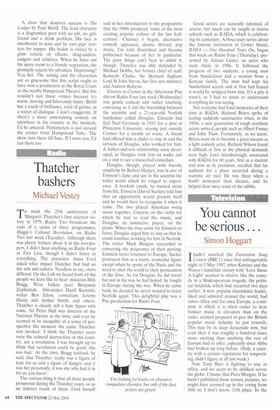Thatcher bashers
Michael Vestey
To mark the 25th anniversary of 1 Margaret Thatcher's first election victory in 1979, Radio Two broadcast the start of a series of three programmes, Maggie's Cultural Revolution, on Radio Two last week (Tuesday). Although there was plenty written about it in the newspapers, I didn't hear anything on Radio Four or Five Live. though I didn't listen to everything. The presenter Anna Ford asked what impact Thatcher had had on the arts and culture. Needless to say, views differed. On the Left we heard from all the people we least like to hear: musician Billy Bragg, West Indian poet Benjamin Zephaniah, film-maker Hanif Kureishi, writer Ben Elton, comedians Jeremy Hardy and Arthur Smith, and others. Thatcher is clearly still a hate figure with some. Sir Peter Hall was director of the National Theatre at the time, and even he seemed to be incapable of a sense of perspective the moment the name Thatcher was invoked: 'I think the Thatcher years were the cultural destruction of this country, not a revolution. I was brought up to think that revolution could be good; this was bad.' At the time, Bragg realised, he said, that Thatcher 'really was a figure of hate for us and a figure of danger, and it was her personally, it was she who had it in for us, you know'.
The curious thing is that all these people prospered during the Thatcher years, or as an indirect result of them. Ford herself said in her introduction to the programme that the 1980s produced 'some of the most exciting popular culture of the last halfcentury'. Channel 4 began, alternative comedy appeared, drama thrived; pop music, I'm told, flourished and became politicised because of her in particular. The poor things can't bear to admit it, though. Thatcher was ably defended by Michael Dobbs, her former chief of staff, Kenneth Clarke, Sir Bernard Ingham, Lord St John Stevas, her first arts minister, and Andrew Roberts.
Einstein in Cromer in the Afternoon Play slot on Radio Four last week (Wednesday) was gentle comedy and rather touching, conveying as it did the friendship between the scientist and a 21-year-old Norfolk handyman called Douglas. Einstein had fled Nazi Germany in 1933 for a post at Princeton University, staying just outside Cromer for a month en route. A friend had offered him a chalet to stay in and the services of Douglas, who worked for him. A father-and-son relationship soon developed, as Douglas took him on walks and on a visit to see a music-hall comedian.
Douglas, though, played with bucolic simplicity by Robert Harper, was in awe of Einstein's fame and saw in the scientist the wider world which he longed to experience. A bookish youth, he wanted more from life. Einstein (David Suchet) told him that an opportunity would present itself and he would have to recognise it when it came. The two played American swing music together, Einstein on the violin for which he had to read the music, and Douglas, an instinctive player, on the piano. When the time came for Einstein to leave, Douglas urged him to stay so that he could continue working for him in Norfolk. The writer Mark Burgess succeeded in conveying the poignancy of their parting; Einstein never returned to Europe. Suchet portrayed him as a warm, avuncular figure except when he spoke of the Nazis and the need to alert the world to their persecution of the Jews. As for Douglas, he did travel but not in the way he had hoped: he fought in Europe during the war. When he came back, he decided he never wanted to leave Norfolk again. This delightful play was a Pier production for Radio Four.
Good actors are naturally talented, of course, but much can be taught at drama schools such as RADA, which is celebrating its centenary. A three-part series about the famous institution in Gower Street, RADA — One Hundred Years On, began this week on Radio Four (Thursday), presented by Adrian Lester, an actor who went there in 1986. It followed the progress of two students, a young man from Sunderland and a woman from a Kenyan family. The man had kept his Sunderland accent and at first had feared it would be stripped from him. It's a pity it wasn't, as I had to strain to understand everything he was saying.
Not everyone had fond memories of their time at RADA. Richard Briers spoke of feeling suddenly unattractive when, in the 1950s, a new generation of tough northern actors arrived, people such as Albert Finney and John Thaw. Fortunately, as we know, Briers went on to become a great success as a light comedy actor. Richard Wilson found it difficult at first as the physical demands were high. Lord Attenborough, associated with RADA for 60 years, first as a student and now as its president, recalled that his audition for a place occurred during a wartime air raid. He was there when a bomb destroyed their theatre, and he helped clear away some of the rubble.


















































































 Previous page
Previous page